
by Sarah Sensamaust | Feb 26, 2014 | 2014, Africa, Cultural Differences, Expat Life, Family, Family Travel, World Motherhood
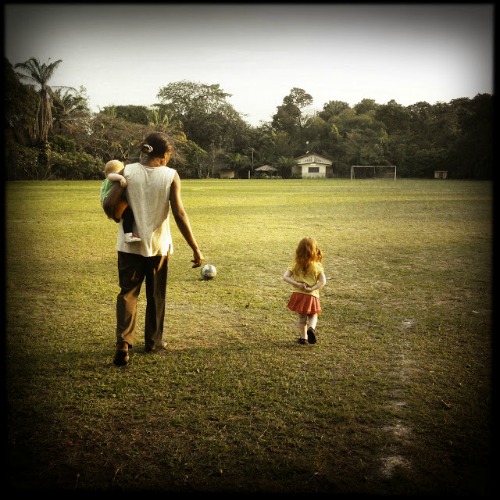 In about three months our lives will drastically change. My husband and I, with our two little girls, will leave the place we’ve called home for the last six years. We will probably never return.
In about three months our lives will drastically change. My husband and I, with our two little girls, will leave the place we’ve called home for the last six years. We will probably never return.
When we first came to Congo, we didn’t know much about the place, we didn’t know a soul here and we definitely didn’t have plans to start a family in this country. My, how everything’s changed.
Just as we had a “feeling” we should move to Congo. Now we have that same “feeling” that it’s time for us to leave. It just feels right and we have wonderful plans on the horizon, but boy is this hard. In fact, we’re feeling a bit lost in our last months here. This is the only home our children have ever known. Our girls have been loved by the nanny or “Mama” who’s helped us raise them for as long as they’ve been loved by us. This will be hard, but it is time.
And so I have lots of questions about how to do this, but more importantly how to do this right. Will there be something meaningful I forget to say or do? Do we make a big deal out of our last goodbyes? Or are our children really too young to understand? There will be tears. There might even be sobs. I hope we don’t needlessly upset them.
I can’t help but think about how much easier our departure would be if we didn’t have children. Their two little lives became a game changer for us living in Congo. Once we had children and the people around us began to care for them and love them, I could feel the roots sprout from my feet and bind us here. They helped us burp our girls when they were babies, nurse them back to health when they were sick, they’ve memorized their every tick and tock. This will be hard, but it is time.
Will our children have any authentic memories from these first years of their lives? Or will their only understanding of Congo come through the stories we tell them over and over? Will the photos they see when they’re older be the only images that remain in their heads? This will be hard, but it is time.
My husband and I always say the hardest part about living abroad is the leaving part. Goodbyes in your host country are usually forever. Sure, it’s hard leaving the United States and saying goodbye to parents and grandparents, but you know they’ll always be a part of your life. You’ll see them again. They’re your home base. They have the internet and email and Facebook and all those other lovely things that keep up connected to those we care about in the States.
When we leave Congo, there will be no email updates. We will not see pictures of the loved ones we leave here. We will miss births and weddings and all the minutiae in between that founded our friendships. This will be hard, but it is still the right time.
Has anyone left the country in which you’ve raised your children, never to return? Was there anything you did to make your last days meaningful or your departure easier?
This is an original post written for World Moms Blog by Sarah. You can find Sarah blogging with Jill Humphrey at Mama Congo.
Photo credit to Jill humphrey.
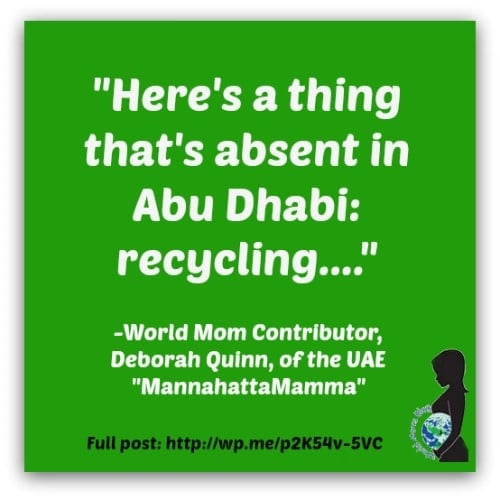
by Mannahattamamma (UAE) | Feb 12, 2014 | 2014, Education, Expat Life, Older Children, UAE, World Motherhood

I turned fifty last month.
See how calmly I said that? Just rolled right off my keyboard with nary a omigodhowdidigetsoold freakout.
Turning fifty in Abu Dhabi, where we’ve lived for the past three years, meant that my family couldn’t be with me to celebrate this milestone (millstone?). On the other hand, celebrating here in a place that still feels quite “new,” reminds me that I’ve avoided one of the big pitfalls of late middle age: falling into a rut. As a wise friend here pointed out to me, when you’ve just upped stakes and settled in a new country, culture, city, you’ve pretty much blown the “rut” wide open.
I’ve gotten used to many new things over our years here–buying Pop-tarts in the “pork room,” Sunday as the start of the work-week, no door-to-door postal service–but there are other things that feel more difficult to resolve, particularly when I think about what my kids are (or aren’t) learning as a result of living here. As with all things, of course, we start to figure out what really matters to us, as parents and as people, when we’re confronted with the absence of that thing.
Here’s a thing that’s absent in Abu Dhabi: recycling. Think about that for a minute, especially those of you who live in the US: think about the fact that it’s become almost second nature to separate your garbage, to flatten the cardboard, take the empty bottles back to the store, to look for products in environmentally-conscious packaging (unless that triples the price in which case…hmm…).
Not here. Oh sure, there are some “recycle” bins in public places, and in the housing development where we live, we have two garbage bins: one for “wet” garbage and one for “dry,” but we’ve watched as both bins get dumped, day after day, into the maw of the same truck. Plastic water bottles are ubiquitous but there isn’t anywhere to recycle them (which will explain why there are about 75 of them under my sink right now–and I think they’re breeding); gas-guzzling SUVs are the norm; and while there is talk about developing solar power here (in the land of eternal sunshine and heat you’d think that would be a no-brainer), nothing as yet has happened.
I use many of these problems as “teaching moments,” trying to explain to my kids about the importance of being environmentally conscious, but it’s been difficult to put anything into action, unlike when we lived in New York, where we took our compost to the farmer’s market to be turned into worm food, separated our trash, and so on.
And then for my birthday, my husband surprised me with two boxes. One was very small and contained things that sparkled. That box was just for me. The other box, much bigger and bulkier, contained a big plastic tub. Much less romantic, perhaps, but a gift for the whole family to–if not enjoy, then at least participate in: Bokashi.
Bokashi is a Japanese word that means fermentation, and bokashi is a method of composting food waste by sprinkling the scraps with “bokashi bran,” which encourages the fermentation process.
All our food scraps (meat, cheese, bread, coffee grounds) go into the bokashi bucket and when the bucket is full, we bury the contents of the bucket in our backyard (although there are other options; see the website for details).
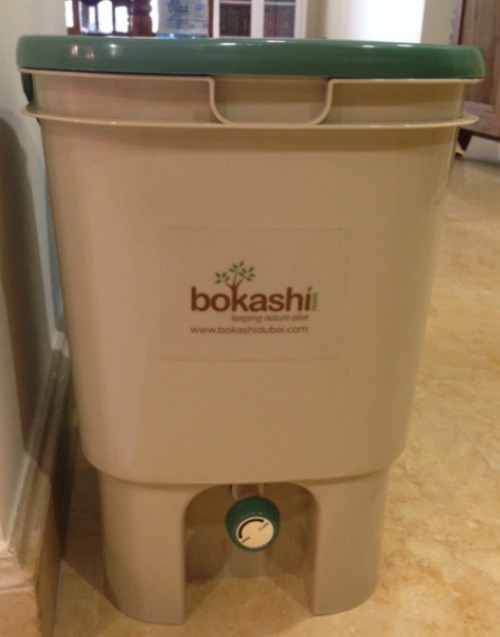
Now my kids have an additional chore: they are the food scrap patrol. Uneaten contents of lunchboxes don’t get dumped at school; they go into the bokashi. Dinner scraps, lunch bits, residue in cooking pots: bokashi, bokashi, bokashi. Not only does composting in this fashion show my boys how much food we throw away and (I hope) make them more mindful about food waste, the process going on inside the bucket is like an ongoing science lesson: molds and other micro-organisms, all right there in the kitchen bucket.
Will this at-home recycling help Abu Dhabi resolve its recycling crisis? Of course not, but at least we are teaching our children (I hope) that everyone can do a small something — and that if enough people do a small something, a Big Something might result. And that’s not a bad lesson –for kids or for fifty year olds.
Is recycling the norm in your country? What do you do to go “green” in your country?
This is an original post to World Moms Blog by Deborah Quinn in the United Arab Emirates of “Mannahattamamma.”
After twenty-plus years in Manhattan, Deborah Quinn and her family moved to Abu Dhabi (in the United Arab Emirates), where she spends a great deal of time driving her sons back and forth to soccer practice. She writes about travel, politics, feminism, education, and the absurdities of living in a place where temperatures regularly go above 110F.
Deborah can also be found on her blog, Mannahattamamma.
More Posts
Follow Me:


by Olga Mecking | Feb 3, 2014 | 2014, Awareness, Being Thankful, Bilingual, Culture, Education, Expat Life, Humanitarian, Inspirational, Language, Life Lesson, Living Abroad, Millennium Development Goals, Motherhood, Moving, Netherlands, Philanthropy, Shot@Life, Social Good, Stress, World Motherhood
 Until a friend of mine had a terrible tragic accident in the Himalaya mountains that left her in a coma, I had never donated to a charity. We collected some money at our wedding to give to her husband, and my mom also donated some money to a charity that takes care of her, but that was it.
Until a friend of mine had a terrible tragic accident in the Himalaya mountains that left her in a coma, I had never donated to a charity. We collected some money at our wedding to give to her husband, and my mom also donated some money to a charity that takes care of her, but that was it.
Since moving to another country and having children, I have been looking for ways to help others. I want to donate to more charities. I am just looking for the right one.
It isn’t easy. I have heard of many charities that have turned out to be scams or which just took people’s money and ran.
My situation is especially difficult because I live in a foreign country and do not know about the charities here. Though my Dutch is fluent, I still have trouble communicating in this language sometimes. In the Netherlands, many people go house-to-house collecting money for charities.
I think it is interesting to find out about charities that way because they’re often ones I’ve never heard of before. They are often small scale actions rather than big ones. But I think the mistake they’re making is the following one: before I contribute, I’d like to find out more about the organization, whether my friends have heard of it, whether there is something about them that raises red flags.
I think I might even agree to donate money if they were willing to leave a business card or something I could find them by. Instead, they want me to make a monthly commitment. Again, because I do not know them, I am not so keen on giving them my credit card number.
At the same time, my heart breaks for all the little children going through invasive treatments; who are terminally ill; who look like little ghosts because they have lost so much weight from all their chemo; for all the sick people who can’t get the treatment they need; or for children who are not so fortunate as mine; or moms in poorer countries, who have to travel for many days if they want to give birth in a hospital.
I really want to help. Since I became a mom and later a World Moms Blog contributor, I have been made aware of needs and dreams that can’t be fulfilled because of the bad conditions all around the world.
But the fact is that finding the right charity isn’t easy. I mostly say no to these door-to-door people. I do it with a heavy heart. I just want to make sure that I am really helping people in need, and not wasting my money.
Luckily, while looking for a charity to donate to, there is a lot I can do:
- In my circle of friends alone, there have been situations where help was needed, including domestic violence and pregnancy problems.
- I am considering taking the Shot@Life pledge and becoming a Champion.
- I can learn as much as I can about actions such as #MDG’s and participate in our Twitter Parties.
- I can find local communities, organizations, charities and brands.
- Many of my friends are absolutely talented people and use their talents to collect money for a good cause, and I can help them spread the word and participate.
I know this sounds like nothing, and I am not telling this to show off how good of a person I am. It is just to show that even though it sounds like nothing, we all can make a difference. I am still very new at this social good cause. I still have a lot to learn. Already I have asked my fellow World Moms Blog contributors for help choosing a charity I can actually trust and they have come up with great charities.
I need to do more. I want to do more. I will do more.
Do you have a charity or cause worth supporting? Tell us about it and help spread the word
This is an original post to World Moms Blog from Olga Mecking in The Netherlands.
The image used in this post is credited to Images Money. It holds a Flickr Creative Commons attribution license.
Olga is a Polish woman living in the Netherlands with her German husband. She is a multilingual expat mom to three trilingual children (even though, theoretically, only one is trilingual since she's old enough to speak). She loves being an expat, exploring new cultures, learning languages, cooking and raising her children. Occasionally, Olga gives trainings in intercultural communication and works as a translator. Otherwise, you can find her sharing her experiences on her blog, The European Mama. Also take a while to visit her Facebook page .
More Posts - Website
Follow Me:




by Jill | Jan 15, 2014 | 2014, Africa, Being Thankful, Cultural Differences, Expat Life, Family, Food, Living Abroad, Motherhood, Poverty, World Motherhood
It used to be so easy.
A $30 box of Rice Krispies was worth writing home about. Sewing pillowcases from pagne fabric was so exciting that I had to Skype my friend in Virginia. Our morning oatmeal topped with cheap passion fruit was worthy of photographic documentation.

I couldn’t stop collecting stories from the new people who suddenly surrounded me. I clearly remember walking to my neighbor’s house one night thinking excitedly, “I am walking…in Africa!” and wondering if I should write a poem.
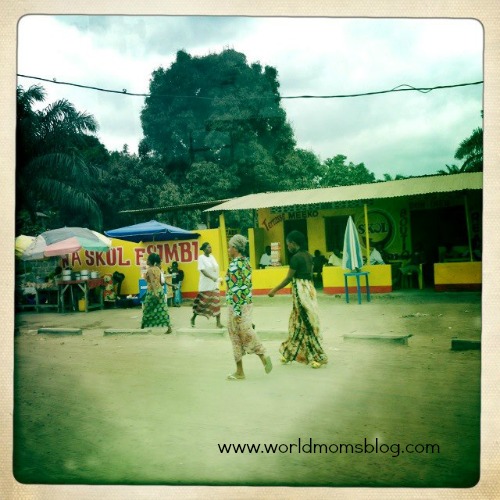
Now, everything about my life seems either too complex to describe, or just not worth it. A few weeks ago I tried to write a fluff piece about the blue tins of Nivea lotion that are ubiquitous around Kinshasa and before I knew it, I was going on about globalization. Other things, I just forget to mention. I don’t notice anymore that it’s weird to pay $40 for laundry detergent, soak your veggies in filtered water and vinegar, stop your car conversation briefly to say “pas aujourd’hui” to a seven-year-old beggar, or pop a live worm out of a person’s skin. These events are ticked off neatly in the daily rhythm of life. I don’t honor them with the thought I once did.
When I sit down to write about my life in Kinshasa, my mind is blank. Sometimes I tell myself that this sudden block is self-preservation. After almost three years, the compounding effects of this city are just too much. In order to function as a nurse and a teacher and a mother and a friend and wife, I can’t stop and ponder every injustice; whether it’s my righteous indignation at the price of the imported fruits I can very well afford to buy, or the story my gardener tells me about the three pregnant teenagers he and his wife feed every day, sometimes giving up their own portion of dinner to do so.
At other moments, I pardon myself by remembering that my lack of enthusiasm is the natural progression of time and familiarity. The honeymoon period with Africa has passed and now I’m just living life. No wonder I don’t hold my pillowcases in rapt reverence anymore. They’re just my red and white pillowcases, getting a little grimy and thin with age. The sellers of trinkets tap at my car windows and I greet those that I know with an open window and a few words and ignore the others. It’s not dramatic, it’s the way to the grocery store.
Then there are the times I berate myself. I’ve become comfortable in my pretty bubble. I let it happen. I cancel French lessons to go to kickboxing class. I allow my housekeeper to buy fruits and veggies for me instead of trekking down the hill to the market and doing it myself. I haven’t learned Lingala. I’ve never seen where the woman who helps me raise my children lives. I’m ridiculous for not being able to write about the Congo. I’m not satisfied with rice and beans and spend hundreds of dollars on imported food that sometimes goes bad before it’s eaten. I don’t listen enough and complain too much. Just another expat.
My parents came to visit Kinshasa just after Christmas – their first time. I felt sad that I couldn’t seem to muster excitement for showing them “our life in Africa.” I couldn’t seem to tap into that newcomer’s elation and share it with them. I hardly took any photos (usually an obsession) and was uninspired by the shots I did snap. My suggestions for food, sights, and experiences were halfhearted. I couldn’t figure out what to do. Even in retrospect, I can’t figure out what I could have done to give them a more authentic experience of my home – which I consider to be wonderful in so many ways. Trying to provide a planned glimpse into my contradictory life proved impossible.
Congo is often described as a country of vicious contradictions: a land bursting at the seams with diamonds, coltan, and fertile dirt yet home to some of the poorest people on earth. NGO workers throw up their hands in frustration and spit nails about failed projects over too many drinks at night. Many of my Congolese friends struggle with the creeping knowledge that they’ve always truly believed it will get better, and it never has. No one I’ve asked has any great ideas. Everyone is just doing the best they can.
I’m not sure what to do with the reality of the Congo I know, so I do the very best I can. Sometimes, that means that I throw myself into the stories of those around me, asking questions I know will lead to heartbreaking tales. Sometimes I read Celebrity Baby Blog instead of Congo Siasa. Sometimes I eat beans and rice. Sometimes I complain loudly about the price of my cereal and buy the box anyway. Sometimes I talk incessantly about the number of mothers and babies who die in this country every day to people who I know are not interested. Sometimes I hear my daughter speaking Lingala and smile proudly.
Sometimes I fret that when I no longer live in Kinshasa, all I will want to do is live in Kinshasa.

What things about your life are too complicated to talk about or even ponder?
This is an original post written for World Moms Blog by Jill Humphrey. You can find Jill blogging with Sarah Sensamaust at Mama Congo.
Photo credits to the author.

by Mannahattamamma (UAE) | Dec 18, 2013 | 2013, Cultural Differences, Culture, Expat Life, Holiday, Older Children, Religion, UAE, World Motherhood
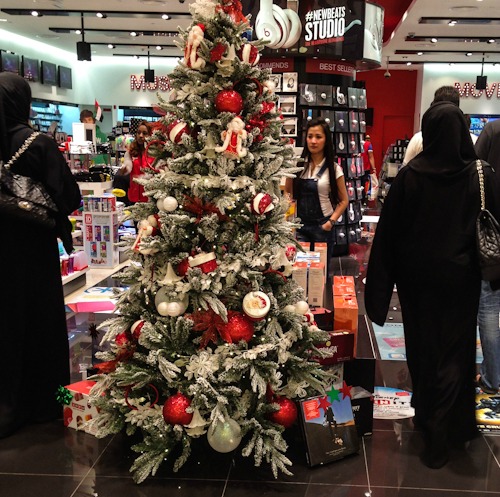
Starting midway through November, the green and red and white streamers appear; houses are bedecked with sparkling lights and buildings attempt to out-bling each other in outrageous green, red and white displays. Festive lights and decorations sprout along streetlights and across shop windows and children get restless in school waiting for the holiday.
Except the red-white-and-green don’t signify Christmas but the UAE National Day, which is celebrated on December 2nd and commemorates the day forty-two years ago when the rulers of seven different fiefdoms signed a constitution and became the United Arab Emirates. Sheikh Zayed, the leader of Abu Dhabi and the first President of the UAE, died in 2004 and his likeness is everywhere on National Day. For those of you in the United States, imagine if George Washington or Thomas Jefferson had died only ten years ago and you’ll have some sense of Zayed’s very long shadow.
For three years now, I’ve experienced a kind of cultural dissonance around National Day, as its colors and lights intersect in my mind with images of New York gussying itself up for the winter holidays. True, the UAE flag has a black stripe in it too, but when the buildings are lit up, they’re mostly lit up in what I think of as “Christmas colors.” In my Facebook stream (which as an expat sometimes almost seems like a real space rather than a virtual one), pictures of people celebrating Thanksgiving or decorating their tree bump up against pictures of cars wrapped in UAE flags and buildings displaying Zayed’s face in lights.
Abu Dhabi prides itself on being a relatively open culture; there are expats living here from almost every country in the world. The international population means that that the city is a smorgasbord of holiday traditions, from Ramadan to Diwali to Christmas; I have friends here who (quietly) celebrate the Jewish High Holy Days, as well.
The malls and shops reflect this cosmopolitan community but in sometimes disconcerting ways: holiday Christmas displays feature Santa on a camel, or Christmas trees draped with UAE flags. It does seem, as Thomas Friedman wrote several years ago, as if the world really is flat. Friedman is talking about economics rather than cultural traditions but I’m starting to think that we can’t really separate the one from the other. Eventually, it seems, we’re all going to be living in versions of the same place: a mall.
The other day, as we walked to the movie theater in the mall (in Abu Dhabi, everything is at some mall or other), past the prayer rooms and the Christmas trees and the UAE flags, my younger son said “How come people fight about religion?” I didn’t have an answer and he’s not yet old enough to be able to appreciate the irony inherent in his question: that in the “Middle East”, a phrase (and place) that still scares many people in the West, my son seems to be learning that different cultural practices can co-exist — not always comfortably but nevertheless without violence.
So happy National Christmas day to you all: may Santa (or whomever) ride his camel to your house and leave you white, red, green, and black striped gifts, and may you all have a happy new year, no matter which calendar you’re using.
This is an original post for the World Mom’s Blog by Deborah Quinn.
Photo credit to the author.
After twenty-plus years in Manhattan, Deborah Quinn and her family moved to Abu Dhabi (in the United Arab Emirates), where she spends a great deal of time driving her sons back and forth to soccer practice. She writes about travel, politics, feminism, education, and the absurdities of living in a place where temperatures regularly go above 110F.
Deborah can also be found on her blog, Mannahattamamma.
More Posts
Follow Me:


by hjunderway | Nov 18, 2013 | 2013, Bilingual, Cultural Differences, Culture, Education, Expat Life, Eye on Culture, France, International, Living Abroad, Milestones, Motherhood, Moving, Preschool, Relocating, School, Stress, Traditions, USA, Working Mother, World Moms Blog, World Motherhood, Younger Children
 The day I gave birth to my son, HJ, is a day I’ll never forget. Induction nightmare? Check. Post baby snuggles? Check. September 3rd birth date? Check.
The day I gave birth to my son, HJ, is a day I’ll never forget. Induction nightmare? Check. Post baby snuggles? Check. September 3rd birth date? Check.
Little did I know at the time how much my son’s birthday would impact his development and education but flash forward to 2013 and here I sit, faced with the first of many educational concerns.
Living in Paris meant that on September 4th, 2012, my son formally entered the French education system. At just three years old, he was invited to attend nursery school, or maternelle, which comprises the first three years of schooling. Due to his inability to speak French, my son was invited to attend school four mornings per week from 8:30 a.m. until 11:40 a.m. As he began to thrive in school, his teacher gently suggested that I begin leaving him for one full-day per week after the holiday break in December. By late-January, he was attending school all day until 4:15 p.m., eating French catered lunch in the cantine (cafeteria), enjoying rest time, and thriving.
Combining his easy going attitude and tall stature (95% percentile for height), most parents thought my son was one of the older kids in the class. In order to start school in September, children must turn three by December 31st, and with a September 3rd birthday, my son was one of the younger students. When I would share this with the parents, they’d say, “Wow, but he is so tall!”
Our plans for HJ’s education were that he would be in French school until we moved home, and at that point he’d transition into kindergarten at the local school. When our contract ended sooner than expected, I began the joyous task of figuring out what options we had to continue HJ’s formal education, and the results were shocking.
HJ misses the US cut-off for kindergarten by two days. This means that he has to wait until he is six to enter kindergarten! I neatly placed that reality aside and instead focused on what education he could receive now, at four years old.
My choices floored me.
Option A) the public school offers a “lottery” for kids ages 3-4 for preschool, and the schedule only allows kids to get one of three spots: two mornings from 8-11, three mornings, four afternoons, or five mornings. And all this for the staggering price of more than $6,000.
Option B) the local Montessori school, which has no openings until September of 2014, and again runs mornings only. Did I mention that they also refused to reveal the actual cost of the program?
And finally, Option C) a local Catholic school that offers five all-day classes for around $7,000.
So what’s the big deal?!
Children in France have access to all-day education beginning at age three for FREE, with master’s degree trained teachers. While every school isn’t as amazing as the one my son attends, the French may be on to something. For two working parents, morning-only, formal education settings are an inconvenience, and for single-income families, shelling out over $6,000 for a few hours a day may be too much.
All around the United States, parents are struggling with making hard financial decisions and I wonder if it seems fair that we have to do so when it comes to our children’s educations?
For us, having HJ evaluated and exploring how he measures up to his peers is one solution. How he falls in the range of social and emotional intelligence will give us a window into how he may fair in kindergarten and will be necessary if we plan on fighting the school district for a spot in kindergarten if it seems logical and appropriate for our son.
The second option is to just ride the wave and instead allow our six year old to join his peers, perhaps giving him a leg up on his classmates. Then I question, “Will he be bored?” “Too big?” At this point I’m just not sure which choice is best for our little guy but it did get my wheels moving, wondering about the significant differences in how each country approaches education. What is it like for children in Germany, or Canada? Do parents struggle with similar issues in Sydney, Australia?
So please, World Moms Blog readers, share your location/country’s educational process! When does school begin? When did your children start school? Anything you wish you could change about your child’s educational experiences?
This is an original post to World Moms Blog from Jacki, mother of one now living in XXX but formerly blogging from Paris, France.
Jacki, or “MommaExpat,” as she’s known in the Internet community, is a former family therapist turned stay-at-home mom in Paris, France. Jacki is passionate about issues as they relate to mothers and children on both domestic and international scenes, and is a Volunteer Ambassador for the Fistula Foundation. In addition to training for her first half marathon, Jacki can be found learning French in Paris and researching her next big trip. Jacki blogs at H J Underway, a chronicle of her daily life as a non-French speaking mom in France.
More Posts

 In about three months our lives will drastically change. My husband and I, with our two little girls, will leave the place we’ve called home for the last six years. We will probably never return.
In about three months our lives will drastically change. My husband and I, with our two little girls, will leave the place we’ve called home for the last six years. We will probably never return.



















